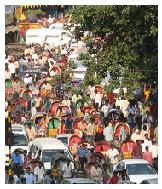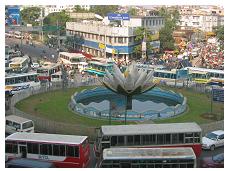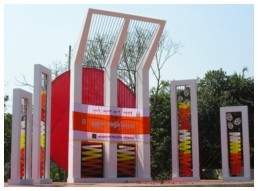|
|
|
|
|
|
|
|
|
|
|
|
|
|
|
|
|
|
|
|
|
|
|
|
|
|
| |
WORLDCOOK'S TRAVELS - DHAKA (Bangladesh) |
|
|
|
Recipes from Bangladesh |
|
Travel to Bangladesh |
|
Travel to other countries |
|
We arrived in
Dhaka, Bangladesh in September 2004. The first weeks were very wet ones, it was the worst
and longest flooding in
many years, which you can see on the pictures. In the months before we
came there was a flooding from the main rivers in Bangladesh, the
Brahmaputra and the Ganges, which left millions of people homeless. | ||
|
| ||
|
| ||
  Apart from all the
water, Bangladesh has another interesting feature: traffic. Bangladesh is
the most densely populated country in the world, many people living on a
small patch of land, and everybody is going somewhere. The roads are
stuffed with buses, cars, baby taxi's,
rickshaws and pedestrians. Apart from all the
water, Bangladesh has another interesting feature: traffic. Bangladesh is
the most densely populated country in the world, many people living on a
small patch of land, and everybody is going somewhere. The roads are
stuffed with buses, cars, baby taxi's,
rickshaws and pedestrians.
The car drivers don't respect the rickshaws and vice versa. Everybody drives with the hand on the horn and uses it at least every two minutes, no matter if there is a reason or not (usually not). So the traffic is incredibly noisy. It takes you an hour to drive 10 kilometers in the city. The pictures are taken on a square in the business center of Dhaka, where traffic goes round in an endless circle, day and night. | ||
|
| ||
 On
the 21st of February, the Bengali people celebrate Amar Ekushey (in Bangladeshi
language this means "Martyr’s Day"). When Pakistan was separated from India in August
1947 (as East and West Pakistan, disconnected by 1,600 kilometers India),
the Bengali language, spoken in East Pakistan, the current Bangladesh, was
under threat. The Western Pakistani held the political power and decided
Urdu should be the national language, even though in East Pakistan the
population was far larger. In 1952, Rafiq, Barkat, Jabbar and Salam, were
killed, as part of a group unarmed protesting students, and thus became
the martyrs, who are remembered on “Bangla Language Martyr’s Day”. In
1999, the UNESCO proclaimed this day as “International Mother Language
Day”, as an incentive to preserve all mother languages. Amar Ekushey has
become a symbol for Bangla independence as well. The monument of Shahid
Minar was erected on the place where the four students were killed. It
represents a mother, protecting her children against the red sun. On
the 21st of February, the Bengali people celebrate Amar Ekushey (in Bangladeshi
language this means "Martyr’s Day"). When Pakistan was separated from India in August
1947 (as East and West Pakistan, disconnected by 1,600 kilometers India),
the Bengali language, spoken in East Pakistan, the current Bangladesh, was
under threat. The Western Pakistani held the political power and decided
Urdu should be the national language, even though in East Pakistan the
population was far larger. In 1952, Rafiq, Barkat, Jabbar and Salam, were
killed, as part of a group unarmed protesting students, and thus became
the martyrs, who are remembered on “Bangla Language Martyr’s Day”. In
1999, the UNESCO proclaimed this day as “International Mother Language
Day”, as an incentive to preserve all mother languages. Amar Ekushey has
become a symbol for Bangla independence as well. The monument of Shahid
Minar was erected on the place where the four students were killed. It
represents a mother, protecting her children against the red sun. | ||
| Biswa Isjtema is a three-day festival, the second-largest congregation of Muslims on the bank of the Turag river. The name stands for something like "World congress". Not everybody participates: serious Muslims have found that this occasion is not mentioned anywhere in the Koran and therefore, they doubt the value. They think that it is just an opportunity to get together and join in meals and useless gossip. Others however enjoy participation (and the meals and gossip), but if the time has come to go home again, they are the first to board the train. | ||
|
|
More Dhaka stories and pictures
| |
|
| ||